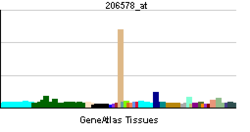Nkx2-5
NM_004387
NM_001166175
NM_001166176
NP_001159647
NP_001159648
NP_004378
Homeobox protein Nkx-2.5 is a protein that in humans is encoded by the NKX2.5 gene.
Homeobox-containing genes play critical roles in regulating tissue-specific gene expression essential for tissue differentiation, as well as determining the temporal and spatial patterns of development (Shiojima et al., 1995). It has been demonstrated that a Drosophila homeobox-containing gene called 'tinman' is expressed in the developing dorsal vessel and in the equivalent of the vertebrate heart. Mutations in tinman result in loss of heart formation in the embryo, suggesting that tinman is essential for Drosophila heart formation. Furthermore, abundant expression of Csx, the presumptive mouse homolog of tinman, is observed only in the heart from the time of cardiac differentiation. CSX, the human homolog of murine Csx, has a homeodomain sequence identical to that of Csx and is expressed only in the heart, again suggesting that CSX plays an important role in human heart formation. In humans, proper NKX2-5 expression is essential for the development of atrial, ventricular, and conotruncal septation, atrioventricular (AV) valve formation, and maintenance of AV conduction. Mutations in expression are associated with congenital heart disease (CHD) and related ailments. Patients with NKX2-5 mutations commonly present AV conduction block and atrial septal defects (ASD). Recently, postnatal roles of cardiac transcription factors have been extensively investigated. Consistent with the direct transactivation of numerous cardiac genes reactivated in response to hypertrophic stimulation, cardiac transcription factors are profoundly involved in the generation of cardiac hypertrophy or in cardioprotection from cytotoxic stress in the adult heart. Nkx-2.5 transcription factor may help myocytes endure cytotoxic stress, however further exploration in this field is required.
...
Wikipedia

